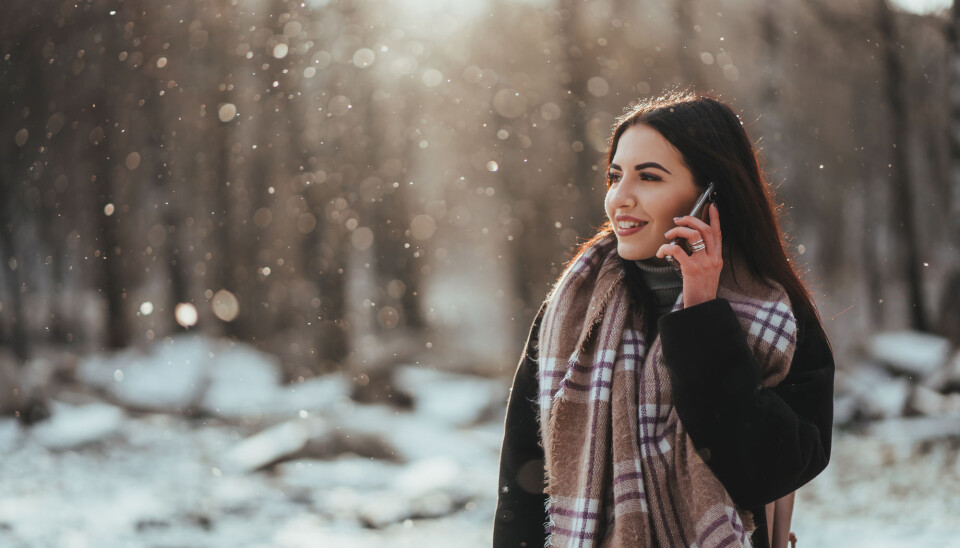
Does being outside when it's really cold make you more exhausted — even if you don’t do anything tiring?
ASK A RESEARCHER: The answer depends on whether you start to freeze or not.
The thermometer has crept far into the minus numbers, and you head out into the winter weather. You take it easy. Maybe you take a short walk or stand still and talk to someone you met along the way.
So how does the cold affect your body? Does cold weather actually make you more exhausted — just because it's cold?
“The simple answer is no, as long as you’re good and warm. If you wear good clothes and your body doesn’t have to work extra to keep warm, then you don’t expend any more energy in cold surroundings,” says Øystein Wiggen, a researcher at SINTEF, an independent research institute.
But it can quickly change if you’re not dressed well enough, Wiggen says.
When you feel like you’re freezing, it’s a sign that your body is losing more heat than it can produce.
Then you begin to shiver, which has a very special function.

Shivering turns your muscles into a heater
“Shivering is the body's defence against cooling,” says Erik Sveberg Dietrichs, a medical doctor at Diakonhjemmet Hospital and an associate professor at UiT — The Arctic University of Norway.
He studies whether heart medicines work just as well for people who have been severely chilled after falling into icy water or being taken by an avalanche.
“The muscles shiver to produce heat. Then they burn nutrients. But instead of allowing you to move, they only produce heat,” says the researcher.
When you stand still and shiver, your muscles are transformed into pure heaters. This is unlike when you move, where some of the energy goes to movement, and the rest is heat.
But do you actually get exhausted from shivering because you’re freezing?
Research subjects shivered for hours
Volunteer participants have sat still for hours in a cold laboratory at SINTEF, while researchers have measured their skin and core temperatures and oxygen uptake.
This allows researchers to follow how low the internal and external temperatures of the participants’ bodies get. And they can also see how much heat the volunteers produce when they shiver.
“People get exhausted from shivering, even if they have just sat still,” Wiggen says about the experiments.
Nerve signals to the brain
And it's not just shivering that makes us more exhausted if we freeze.
Dietrichs says that our body has several defence mechanisms against cold. Our core temperature should preferably remain around 37 degrees C.
“If your skin gets cold, the nerves send signals to the temperature system in the brain,” he said. “The brain does everything it can to prevent us from getting too cold.”
- RELATED: Perhaps you also want to know, Is cold water swimming in the winter healthy?
Blood vessels in the muscles contract
In addition to the fact that the muscles begin to shiver, the blood vessels inside them contract, Dietrichs says.
At this stage, the vital organs, such as the brain, heart and lungs, must be prioritized.
If your muscles get less blood supply, they work a little worse. That may mean you may not be able to do perform as well as you usually do.
Another defence the brain uses to fight the cold is to direct the body to deal with the situation, he said.
“You will instinctively seek warmth and try to move when you start to freeze,” he points out.
Lots of heat from movement
Physical activity is an effective way to stay warm — which is something that everyone who has tried to keep from freezing in the cold knows.
But shivering seems almost illogical. Because if shivering turns your muscles into pure heaters, shouldn't you just stand still and let them do their thing?
Øystein Wiggen explains why this is not a good idea.
Your muscles can create much more heat when you are physically active than when you sit and shiver, even if some of your energy also goes to movement.

Dietrichs uses himself as an example. He jogs to work in the winter, without getting cold or feeling more exhausted than he usually does when it is hot outside.
Because it can get too hot — in the summer.
There are deaths during marathons that are due to overheating, the researcher points out.
From pain to numb
Both researchers also add that it’s important to be aware that we can get frostbite when it is very cold.
“It can get so cold that your protective system is destroyed. If you get frostbite, your body’s sensors may stop working, and your body will not begin counteractive measures,” Dietrichs said.
The sensors that detect cold are mainly found in the skin. And this is also where frost can do its damage.
“First you feel cold, then you start to hurt and then you turn numb. Then the risk of frostbite increases because you can’t feel your extremities in the same way,” says Wiggen.
Two more things can make you more tired in the cold.
One is from wearing a lot more clothes, which means that you have to use a little more energy to move.
The other is if you have cold-induced asthma, you will be more tired.
Translated by: Nancy Bazilchuk
———































